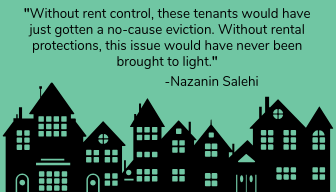September 6, 2019
by Mark Noac
The signs are everywhere: overgrown weeds, rusted lawn furniture and an eerie absence of people. It's not just a lack of maintenance, it's an aura hanging over the entire community that knows the end is near.
Within three weeks, all 59 apartments at the complex must be vacated. Starting next month, the neighborhood is slated to be demolished to make way for new condominiums.
For now, the scattered residents who remain are taking stock, trying to secure new housing amid an unpleasant set of choices. Given the high cost of housing, many have decided their only option is to leave Mountain View.
For Leland Erickson, this also means his family is being fractured. He plans to sleep on a friend's couch in Oregon while his partner of 20 years is moving out to North Carolina. It just didn't make sense to move to a new apartment in the Bay Area because all the options meant paying more and being substantially worse off.
In hindsight, Erickson said his life at the Rock Street apartments seemed so stable and quaint. His family could pay rent on one income, and they were saving money and paying off their debts, he said.
"We were making our lives better, rebuilding ourselves. We had hope," he said. "Now we're in a Catch-22 situation, and it feels like we're being thrown right into a tree grinder."
Under the city's rules, each displaced tenant household is receiving a cash payment equal to three months of rent, plus extra for special needs residents. While the money is helpful, tenants across the board say it is insufficient to address the expenses of relocating. Erickson says his payment will likely only cover his moving costs, which are expected to run $7,000 or more.
The 2310 Rock St. tenants are hardly alone. In the last three years, about 300 older, more affordable apartments in Mountain View have been taken off the market amid plans to redevelop the property into for-sale housing, according to city records. Of those being displaced, about 20 households are scheduled to move out of a 20-unit apartment complex at 2005 Rock St. Last month, 33 apartments at 1950 Montecito Ave. were also emptied.
The loss of these cheaper, older apartments has taken on a political dimension in the city's supercharged debate over housing. Landlords and some city officials have repeatedly taken aim at the city's rent control law, arguing that apartments are being torn down because property owners are seeing their revenues decline. In response, city officials have fast-tracked plans to draft a ballot measure to revise the city's rent control law.
But tenant advocates say this is being used as a pretext to roll back renter protections. Redevelopments were taking place well before rent control was enacted, but the law provides a convenient scapegoat, said Nazanin Salehi, an attorney with the Community Legal Services of East Palo Alto (CLSEPA).
"Without rent control, these tenants would have just gotten a no-cause eviction," she said. "To say rent control is the cause is disingenuous. Without rental protections, this issue would have never been brought to light."
Salehi and other CLSEPA attorneys advocated on behalf of the displaced tenants on Rock Street, urging city officials not to grant building permits for the projects. Instead, they proposed new policies, such as an ordinance to prohibit residential projects that reduce the total number of homes on a site. Another idea was for tenants or housing nonprofits to be given the first right of refusal to purchase an apartment property that goes on the market. Mountain View city staffers are currently drafting their own proposals.
CLSEPA attorneys say they are also considering a potential lawsuit against the city of Mountain View, arguing that city officials are violating fair housing rules by allowing affordable housing to be razed.
In any case, those potential reforms will come too late to save the Rock Street tenants.
Among the residents still scrambling to find a new home is Jacqueline Cashen, who has lived at the apartment complex with her daughter for more than 15 years. Both of them have jobs, but they haven't had any luck finding new housing in Mountain View, in part because many landlords now screen out tenants who aren't earning more than three times the monthly rent. Cashen's last potential opportunity was an apartment in Fremont that would still cost $1,000 more per month than her current home.
For more than a year, Cashen was trying to organize her neighbors to protest the planned demolition. She and her neighbors spoke at several public meetings, and they arranged in-person sessions with elected leaders. But it made little difference in the end: The project was unanimously approved with minimal changes.
Now it is getting hard to keep track of her neighbors since everyone must now look out for themselves, she said. Families are here one day, then they suddenly disappear with barely a goodbye. Butters, a neighborhood cat, came up to Cashen and nuzzled her leg as she spoke.
"I just don't want other people to have to endure what we went through," she said. "The only people who are going to be left in this town soon are the techies and property owners, because the serfs can no longer make it here."
Email Mark Noack at mnoack@mv-voice.com

